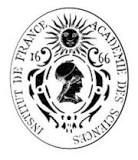La Conférence des Balkans occidentaux propose une nouvelle instance internationale pour soutenir les scientifiques juniors
 La Conférence des Balkans occidentaux (Western Balkans Conference) propose une nouvelle instance internationale pour soutenir les scientifiques juniors
La Conférence des Balkans occidentaux (Western Balkans Conference) propose une nouvelle instance internationale pour soutenir les scientifiques juniors
Communiqué de presse conjoint [en anglais]
20 July 2017
Western Balkans Conference initiates new international institution to support junior scientists
Following the recommendation of the "Joint Science Conference", which was jointly organised by the German National Academy of Sciences Leopoldina and the French Académie des sciences, the Heads of State and Government decided at the Western Balkans Conference on 12 July in Trieste, Italy, to establish a foundation to support junior scientists at scientific institutions in the Balkans.
The Joint Science Conference is one of the pillars of the "Western Balkans Process / Berlin Process", an initiative of the German Chancellor Angela Merkel, aiming to support the integration of the
Balkan countries into the European Union.
The Paris Joint Science Conference brought together scientists and representatives of national academies, rectors' conferences and research organisations from the 13 countries of the Western Balkans Process. They discussed strategies to improve the national science systems and to create growth in Southeastern Europe through education, research and innovation. The proceedings focused on ways to fund research activities of junior scientists in the Western Balkans, aiming to slow down brain drain and - at the same time - create structures of excellent research and intensify cooperation between researchers from the EU and the Western Balkans.
The results were summarised in a Joint Statement, providing independent advice to political decision-makers.
The Joint Statement features the proposal to establish an international foundation, which should award grants to outstanding junior scientists, enabling them to create their own research labs and teams in the Balkan countries within five to seven years. The grants should be awarded irrespective of origins and scientific affiliation, solely based on quality criteria. On 12 July, the Heads of State and Government have accepted this proposal and decided to start the process of establishing the Foundation. The Joint Science Conference of the Western Balkans Process shall manage the implementation.
The Joint Statement and further information on the science-based input of the Western Balkans Process is available on the dedicated webpages: www.leopoldina.org/en/jsc or
http://www.academie-sciences.fr/fr/Communiques/processus-balkans-occidentaux.html
Fourteen parties currently participate in the Western Balkans Process: the EU member states Germany, France, Austria, Italy, Croatia, Slovenia and the United Kingdom, together with the six Western Balkans states Albania, Bosnia and Herzegovina, Kosovo, FYRo Macedonia, Montenegro and Serbia as well as the European Commission. The process supports the efforts to integrate the Western Balkan countries into the EU and to strengthen the regional cooperation in politics, economy, education, science and society. The Leopoldina was entrusted by the German Federal Government to take the lead in the subject area of science and society.
With the expertise of some 1,500 distinguished scientists, the German National Academy of Sciences Leopoldina addresses key issues of particular significance for the future of society from a scientific perspective and independently of economic or political interests, shares its findings with policymakers and the public. The Leopoldina represents the German scientific community in international committees and pursues the advancement of science for the benefit of humankind and for shaping a better future.
Created in 1666, the Académie des Sciences gathers some of the most eminent French and foreign scientists.
With 260 members, 90 corresponding members and 120 foreign members, the Académie des sciences is a multidisciplinary assembly with an open international outlook. In line with a long tradition, the Académie is heavily engaged in encouraging scientific life, promoting science education at all levels, advising the government and the public on issues involving science and society and representing the French scientific community on the international level in science networks and bilateral collaborations.